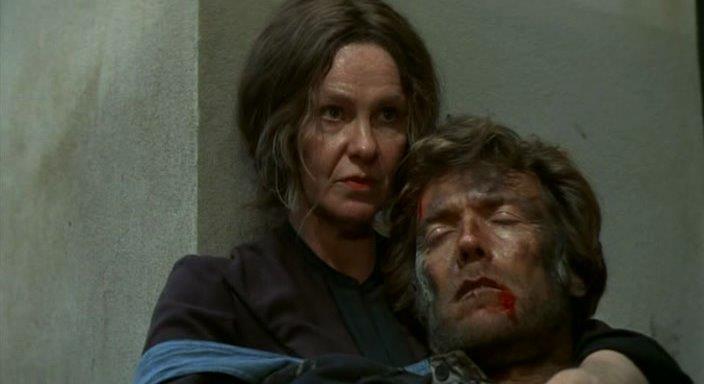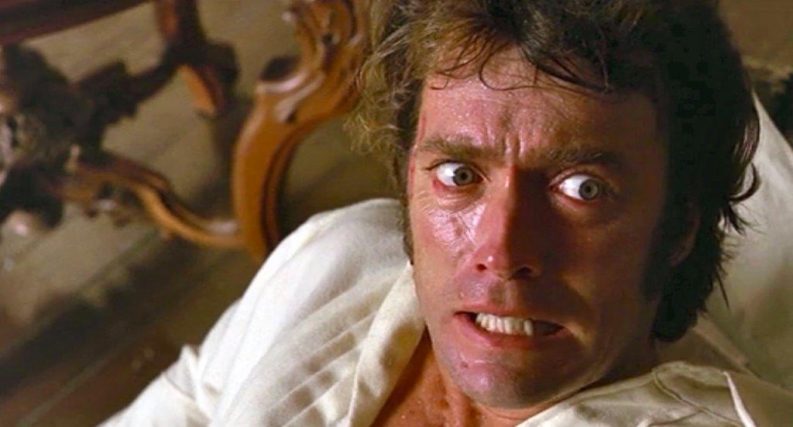“I’ve died in two pictures now,” Clint Eastwood told Roger Ebert in 1986, “and neither one was successful. Honkytonk Man and The Beguiled.” The Mount Rushmore-ready actor, producer, and director might have eventually hit pay dirt by dying on-screen with 2008’s Gran Torino, but until then, he was clearly worth a lot more alive than dead. A bona fide box office titan since the sixties, Eastwood’s financial disappointments have been rare, and The Beguiled is undoubtedly one of his biggest stand-out failures. It is also undoubtedly Eastwood’s most daring and ambitious film as an actor.
While his detours into the unusual have been many (High Plains Drifter, Tightrope, Play Misty For Me, Thunderbolt And Lightfoot and several more toyed gleefully with both genre conventions and Eastwood’s on-screen image), Eastwood has never gone as far and deep into the woods as he did with 1971’s The Beguiled. The film was just as against-the-grain for director, Don Siegel, with whom Eastwood had worked on the brilliant 1968 neo-western, Coogan’s Bluff, and the curious 1970 western, Two Mules For Sister Sara. The pair would have one of their greatest successes, however, later in 1971 with the epochal cop thriller, Dirty Harry. Collectively known for their muscular cinematic output, The Beguiled was an uncharacteristically quiet and low key work for Eastwood and Siegel, and boasted a sensibility that could not unfairly be described as distinctly European.

Gloomy, dark, and unsettling, this eerie slab of southern Gothic is set during The Civil War, and sees Eastwood’s lost and injured Union soldier, John McBurney, taking shelter in an all-girl boarding school in Louisiana. A charming cad, McBurney soon has the school’s student body and teaching staff in a lather, cutting deep into the until-then tedious lives of twelve-year-old Amy (Pamelyn Ferdin); sweet, repressed schoolteacher, Edwina (Elizabeth Hartman); and domineering headmistress, Martha Farnsworth (Geraldine Page). The proverbial fox in the henhouse, McBurney’s loping, unapologetic brand of sexuality and quiet cruelty will eventually be his undoing, as he falls victim to several women scorned.
Adapted from the novel by Thomas Cullinan, The Beguiled is visually audacious (there’s even a baroque Christ tableau at one point, a bizarre piece of symbolism from the usually no-nonsense Siegel) and practically fetid with atmosphere – you can almost smell the fecund forest that surrounds the film’s schoolhouse and the sweat that soon permeates its halls. The sense of encroaching dread, meanwhile, is palpable, as McBurney’s increasingly brutish behaviour (the wounded soldier becomes less sympathetic with each scene) pushes him irrevocably toward his fate. Hobbled and hardly heroic, it soon becomes clear that this Eastwood anti-hero-come-villain is destined not to leave this Louisiana schoolhouse. Called “bizarre enough for Bunuel” by The Financial Times, The Beguiled starts out as a sexually driven drama and gradually twists and turns into a psychological horror opus.
It’s a tour de force from Don Siegel, who coaxes a brilliant one-time-only performance out of Eastwood, who uses his rawboned sexuality to far different ends here than previously, visiting violence upon innocents without the aid of a six shooter. “The performances are uniformly excellent,” said The Hollywood Reporter, “with Clint Eastwood being the most impressive, particularly in the second half of the film in which he is called upon to break with the more passive dimensions of the role and demonstrate a greater versatility and range than his past work has indicated.” His John McBurney is the dark, morally unsound centre around which the film spins, making The Beguiled a deliriously unsettling experience.

Eastwood with Pamela Ferdin
Eastwood’s destructive callousness, however, was reserved for the screen. “He was wonderful,” his co-star, Pamela Ferdin recalled in 2015. “He had children about my same age. He was a little bit homesick at the time we were in Louisiana. It’s really just him and me at the beginning of the movie. In between scenes, he would talk about his kids. He called me his ‘little dove.’ At the end of the movie, he gave me two doves to keep.” A regular on TV, The Beguiled remains Ferdin’s defining key work, and it’s one of the great child actor performances.
It’s also a key work for actress, Elizabeth Hartman, who shot to fame with her Oscar nominated performance in 1965’s A Patch Of Blue. She is extraordinary as the fragile Edwina, and you can practically hear her emotionally cracking and crumbling as Eastwood’s McBurney starts to exert his sexual pressure. With so few films (Walking Tall, The Fixer, You’re A Big Boy Now) on her resume, the performance of Hartman – who tragically committed suicide in 1985 by jumping from a fifth floor apartment window after a long battle with depression and mental illness – is one to be savoured. As is that of Geraldine Page, with the veteran actress towering in her portrayal of repression and ultimate release.

Eastwood with Elizabeth Hartman
Despite the fine performances and superb direction, the flat-out weirdness of The Beguiled meant that it never really had a chance. The film’s backing studio, Universal, tried to sucker audiences with a poster featuring a misleadingly gun-toting Eastwood, but pretty much let this steamy hothouse horror flick burn out quietly, never really pushing it with the full force of its marketing department. The film has since become a cult curio and an academic talking point, with many theorists tagging it as a truly misogynist piece of filmmaking, with Eastwood’s virile male literally surrounded by ravenous and enraged females.
It’s a reading not helped by Don Siegel’s own now infamous assessment of his film’s themes. “Women are capable of deceit, larceny, murder, anything,” the famously to-the-point filmmaker told journalist, Stuart Kaminsky. “Behind that mask of innocence lurks just as much evil as you’ll find in members of the Mafia. Any young girl, who looks perfectly harmless, is capable of murder.” To label The Beguiled wholly misogynist, however, is a little unfair, and also simplistic, even in light of its director’s unadorned mission statement. Eastwood’s McBurney is no hero, and Siegel has an obvious and genuine affection for his female characters, who are only pushed to vengeance when their male visitor leaves them no choice. In this world, everyone is either horribly damaged or capable of ferocious malice.

Eastwood with Geraldine Page
It is this perceived misogyny, however, that provided Sofia Coppola with an entry point into her remake of The Beguiled, which recently saw the helmer of Lost In Translation and The Virgin Suicides pick up the Best Director Award at The Cannes Film Festival. “Remake is a bad word in my family,” she said at The Provincetown Film Festival, instantly evoking her old man and The Godfather and Apocalypse Now movie legend, Francis Ford Coppola. “My dad says nobody remakes a movie unless it’s to make money. There’s no other reason to do it.”
Coppola’s reason is to tell the story from an entirely different perspective, instantly making her take on The Beguiled much more than a simple remake. “The 1971 film is really the guy’s point-of-view,” the director told Film Comment. “The soldier comes in, and it’s like a fantasy that turns into a nightmare. In this version, I’m connecting to the female characters. They’re not a mystery, and they’re more human. It’s about how their complexities are being torn between what they should do, and their desires. The soldier is more mysterious. It’s sort of the opposite look at the same story.”
It’s a fascinating approach, and it also means that Don Siegel’s cruelly disenfranchised The Beguiled – for so long a lonely and isolated but utterly absorbing exercise in Southern horror and moral misanthropy – now has a cinematic companion piece, as opposed to an artistic usurper. And when it comes to this quietly waged battle of the sexes, that’s curiously and perversely affirming…
The Beguiled is released in cinemas on July 13






